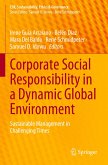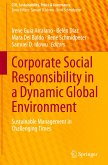Global Perspectives on Green HRM
Highlighting Practices Across the World
Herausgegeben:Adekoya, Olatunji David; Mordi, Chima; Ajonbadi, Hakeem Adeniyi
Global Perspectives on Green HRM
Highlighting Practices Across the World
Herausgegeben:Adekoya, Olatunji David; Mordi, Chima; Ajonbadi, Hakeem Adeniyi
- Gebundenes Buch
- Merkliste
- Auf die Merkliste
- Bewerten Bewerten
- Teilen
- Produkt teilen
- Produkterinnerung
- Produkterinnerung
Environmental sustainability has become increasingly important because of irreversible climate change, widespread environmental pollution, and dwindling resource availability over time. Organisations have recently come under more pressure due to increasing economic, political, and societal concerns to address environmental issues and improve their environmental performance. Recently, green human resource management (Green HRM), among other sustainable environmental strategies adopted by organisations, has gained popularity, yet little has been published on green HRM practices across the…mehr
Andere Kunden interessierten sich auch für
![Global Perspectives on Green HRM Global Perspectives on Green HRM]() Global Perspectives on Green HRM129,99 €
Global Perspectives on Green HRM129,99 €![Green Human Resource Management Research Green Human Resource Management Research]() Green Human Resource Management Research81,99 €
Green Human Resource Management Research81,99 €![Green Human Resource Management Research Green Human Resource Management Research]() Green Human Resource Management Research81,99 €
Green Human Resource Management Research81,99 €![Green Behaviors in the Workplace Green Behaviors in the Workplace]() Virginie FrancoeurGreen Behaviors in the Workplace41,99 €
Virginie FrancoeurGreen Behaviors in the Workplace41,99 €![Entrepreneurship, Technological Change and Circular Economy for a Green Transition Entrepreneurship, Technological Change and Circular Economy for a Green Transition]() Entrepreneurship, Technological Change and Circular Economy for a Green Transition121,99 €
Entrepreneurship, Technological Change and Circular Economy for a Green Transition121,99 €![Corporate Social Responsibility in a Dynamic Global Environment Corporate Social Responsibility in a Dynamic Global Environment]() Corporate Social Responsibility in a Dynamic Global Environment129,99 €
Corporate Social Responsibility in a Dynamic Global Environment129,99 €![Corporate Social Responsibility in a Dynamic Global Environment Corporate Social Responsibility in a Dynamic Global Environment]() Corporate Social Responsibility in a Dynamic Global Environment129,99 €
Corporate Social Responsibility in a Dynamic Global Environment129,99 €-
-
-
Environmental sustainability has become increasingly important because of irreversible climate change, widespread environmental pollution, and dwindling resource availability over time. Organisations have recently come under more pressure due to increasing economic, political, and societal concerns to address environmental issues and improve their environmental performance. Recently, green human resource management (Green HRM), among other sustainable environmental strategies adopted by organisations, has gained popularity, yet little has been published on green HRM practices across the globe.
This book develops our understanding and practice of green HRM across the globe, highlighting practices across different countries on different continents, with a particular focus on the Global South. The authors draw on various types of research (conceptual, theoretical and empirical) and incorporate contextual issues such as technology, politics, culture, and economics to supplement the readers' insights into the current state of green HRM practices across the globe. By highlighting theoretical underpinnings and emphasising the practical relevance of green HRM practices, this book offers an insightful guide for scholars and students of HRM, as well as HR professionals looking for an academic insight to this vitally important area.
This book develops our understanding and practice of green HRM across the globe, highlighting practices across different countries on different continents, with a particular focus on the Global South. The authors draw on various types of research (conceptual, theoretical and empirical) and incorporate contextual issues such as technology, politics, culture, and economics to supplement the readers' insights into the current state of green HRM practices across the globe. By highlighting theoretical underpinnings and emphasising the practical relevance of green HRM practices, this book offers an insightful guide for scholars and students of HRM, as well as HR professionals looking for an academic insight to this vitally important area.
Produktdetails
- Produktdetails
- Verlag: Palgrave Macmillan / Springer Nature Switzerland / Springer, Berlin
- Artikelnr. des Verlages: 978-3-031-35794-7
- 2023
- Seitenzahl: 328
- Erscheinungstermin: 29. August 2023
- Englisch
- Abmessung: 216mm x 153mm x 23mm
- Gewicht: 538g
- ISBN-13: 9783031357947
- ISBN-10: 3031357949
- Artikelnr.: 68063685
- Herstellerkennzeichnung Die Herstellerinformationen sind derzeit nicht verfügbar.
- Verlag: Palgrave Macmillan / Springer Nature Switzerland / Springer, Berlin
- Artikelnr. des Verlages: 978-3-031-35794-7
- 2023
- Seitenzahl: 328
- Erscheinungstermin: 29. August 2023
- Englisch
- Abmessung: 216mm x 153mm x 23mm
- Gewicht: 538g
- ISBN-13: 9783031357947
- ISBN-10: 3031357949
- Artikelnr.: 68063685
- Herstellerkennzeichnung Die Herstellerinformationen sind derzeit nicht verfügbar.
Olatunji David Adekoya is a Senior Lecturer at the College of Business, Technology and Engineering, Sheffield Hallam University, UK. His research examines HRM in African countries, with a strong focus on work-life balance, organisational flexibility and employment relations. He has published widely in books and journals. Chima Mordi is a Reader/Associate Professor in the College of Business, Arts and Social Sciences at Brunel University, UK. His research examines international business in emerging and developing markets, including the state of labour relations, comparative HRM in Africa, Asia and Middle Eastern countries, employer's flexibility, the regulation of workloads in large firms, and work-life balance of white collar-workers. Hakeem Adeniyi Ajonbadi is a Lecturer in International Human Resource Management and Organisational Development at Birmingham City University, UK. He has taught in several countries, including the UK, UAE, Belgium andNigeria. He has published widely in books and journals.
Chapter 1: Green Human Resource Management: An Introduction Olatunji David Adekoya, Chima Mordi and Hakeem Adeniyi Ajonbadi.- Chapter 2: Approaches to Studying Green Human Resource Management: Do All the Roads Lead to Rome? Cem Tanova and Steven W. Bayighomog.- Chapter 3: Greening China, Malaysia and Pakistan through Deploying Green HR Practices to Spur Environmental Sustainability: A Systematic Literature Review Shumaila Naz and Syed Arslan Haider.- Chapter 4: Impact of Green HRM Practices on Employees' Pro-Environmental Behaviour in the United Kingdom Olatunji David Adekoya, Hakeem Adeniyi Ajonbadi and Chima Mordi.- Chapter 5: Green Human Resource Management: A Preliminary Qualitative Study of Green HRM Awareness, Practices and Outcomes in the Malaysian Manufacturing Context Jing Yi Yong and Mohd Yusoff Yusliza.- Chapter 6: The Moderating Role of Gender and Employee Championing Behaviour in the Relationship Between Green Human Resource Management Practices and Sustainable Organisational Performance: Evidence from Bangladesh Md Asadul Islam, Md Shahadat Hossain, Mohammad Enamul Hoque, Tanzin Khan and Md Mahamudul Hassan.- Chapter 7: The Effect of Green Organizational Culture on Environmental Citizenship in the Egyptian Tourism and Hospitality Sector: The Mediating Role of Green Human Resource Management Bassam Samir Al-Romeedy Chapter 8: Green HRM: A Zimbabwean Perspective Tabani Ndlovu and Sihle Ndlovu.- Chapter 9: Greening the Nonprofit Sector: Evidence from Palestinian NPOs Mohammed Aboramadan and Emmanuel Twumasi Ampofo.- Chapter 10: The Role of Green Human Resource Management in Promoting Occupational Health and Environmental Sustainability in Nigeria Olatunji David Adekoya, Hakeem Adeniyi Ajonbadi and Chima Mordi.- Chapter 11: Green Human Resource Management in Latin America: A Systematic Literature Review and Agenda for Future Research Adriano Alves Teixeira, Talita Borges Teixeira, Tiago Estrela da Cunha Moraes, Eduardo Lopes Pereira.
Chapter 1: Green Human Resource Management: An Introduction Olatunji David Adekoya, Chima Mordi and Hakeem Adeniyi Ajonbadi.- Chapter 2: Approaches to Studying Green Human Resource Management: Do All the Roads Lead to Rome? Cem Tanova and Steven W. Bayighomog.- Chapter 3: Greening China, Malaysia and Pakistan through Deploying Green HR Practices to Spur Environmental Sustainability: A Systematic Literature Review Shumaila Naz and Syed Arslan Haider.- Chapter 4: Impact of Green HRM Practices on Employees’ Pro-Environmental Behaviour in the United Kingdom Olatunji David Adekoya, Hakeem Adeniyi Ajonbadi and Chima Mordi.- Chapter 5: Green Human Resource Management: A Preliminary Qualitative Study of Green HRM Awareness, Practices and Outcomes in the Malaysian Manufacturing Context Jing Yi Yong and Mohd Yusoff Yusliza.- Chapter 6: The Moderating Role of Gender and Employee Championing Behaviour in the Relationship Between Green Human Resource Management Practices and Sustainable Organisational Performance: Evidence from Bangladesh Md Asadul Islam, Md Shahadat Hossain, Mohammad Enamul Hoque, Tanzin Khan and Md Mahamudul Hassan.- Chapter 7: The Effect of Green Organizational Culture on Environmental Citizenship in the Egyptian Tourism and Hospitality Sector: The Mediating Role of Green Human Resource Management Bassam Samir Al-Romeedy Chapter 8: Green HRM: A Zimbabwean Perspective Tabani Ndlovu and Sihle Ndlovu.- Chapter 9: Greening the Nonprofit Sector: Evidence from Palestinian NPOs Mohammed Aboramadan and Emmanuel Twumasi Ampofo.- Chapter 10: The Role of Green Human Resource Management in Promoting Occupational Health and Environmental Sustainability in Nigeria Olatunji David Adekoya, Hakeem Adeniyi Ajonbadi and Chima Mordi.- Chapter 11: Green Human Resource Management in Latin America: A Systematic Literature Review and Agenda for Future Research Adriano Alves Teixeira, Talita Borges Teixeira, Tiago Estrela da Cunha Moraes, Eduardo Lopes Pereira.
Chapter 1: Green Human Resource Management: An Introduction Olatunji David Adekoya, Chima Mordi and Hakeem Adeniyi Ajonbadi.- Chapter 2: Approaches to Studying Green Human Resource Management: Do All the Roads Lead to Rome? Cem Tanova and Steven W. Bayighomog.- Chapter 3: Greening China, Malaysia and Pakistan through Deploying Green HR Practices to Spur Environmental Sustainability: A Systematic Literature Review Shumaila Naz and Syed Arslan Haider.- Chapter 4: Impact of Green HRM Practices on Employees' Pro-Environmental Behaviour in the United Kingdom Olatunji David Adekoya, Hakeem Adeniyi Ajonbadi and Chima Mordi.- Chapter 5: Green Human Resource Management: A Preliminary Qualitative Study of Green HRM Awareness, Practices and Outcomes in the Malaysian Manufacturing Context Jing Yi Yong and Mohd Yusoff Yusliza.- Chapter 6: The Moderating Role of Gender and Employee Championing Behaviour in the Relationship Between Green Human Resource Management Practices and Sustainable Organisational Performance: Evidence from Bangladesh Md Asadul Islam, Md Shahadat Hossain, Mohammad Enamul Hoque, Tanzin Khan and Md Mahamudul Hassan.- Chapter 7: The Effect of Green Organizational Culture on Environmental Citizenship in the Egyptian Tourism and Hospitality Sector: The Mediating Role of Green Human Resource Management Bassam Samir Al-Romeedy Chapter 8: Green HRM: A Zimbabwean Perspective Tabani Ndlovu and Sihle Ndlovu.- Chapter 9: Greening the Nonprofit Sector: Evidence from Palestinian NPOs Mohammed Aboramadan and Emmanuel Twumasi Ampofo.- Chapter 10: The Role of Green Human Resource Management in Promoting Occupational Health and Environmental Sustainability in Nigeria Olatunji David Adekoya, Hakeem Adeniyi Ajonbadi and Chima Mordi.- Chapter 11: Green Human Resource Management in Latin America: A Systematic Literature Review and Agenda for Future Research Adriano Alves Teixeira, Talita Borges Teixeira, Tiago Estrela da Cunha Moraes, Eduardo Lopes Pereira.
Chapter 1: Green Human Resource Management: An Introduction Olatunji David Adekoya, Chima Mordi and Hakeem Adeniyi Ajonbadi.- Chapter 2: Approaches to Studying Green Human Resource Management: Do All the Roads Lead to Rome? Cem Tanova and Steven W. Bayighomog.- Chapter 3: Greening China, Malaysia and Pakistan through Deploying Green HR Practices to Spur Environmental Sustainability: A Systematic Literature Review Shumaila Naz and Syed Arslan Haider.- Chapter 4: Impact of Green HRM Practices on Employees’ Pro-Environmental Behaviour in the United Kingdom Olatunji David Adekoya, Hakeem Adeniyi Ajonbadi and Chima Mordi.- Chapter 5: Green Human Resource Management: A Preliminary Qualitative Study of Green HRM Awareness, Practices and Outcomes in the Malaysian Manufacturing Context Jing Yi Yong and Mohd Yusoff Yusliza.- Chapter 6: The Moderating Role of Gender and Employee Championing Behaviour in the Relationship Between Green Human Resource Management Practices and Sustainable Organisational Performance: Evidence from Bangladesh Md Asadul Islam, Md Shahadat Hossain, Mohammad Enamul Hoque, Tanzin Khan and Md Mahamudul Hassan.- Chapter 7: The Effect of Green Organizational Culture on Environmental Citizenship in the Egyptian Tourism and Hospitality Sector: The Mediating Role of Green Human Resource Management Bassam Samir Al-Romeedy Chapter 8: Green HRM: A Zimbabwean Perspective Tabani Ndlovu and Sihle Ndlovu.- Chapter 9: Greening the Nonprofit Sector: Evidence from Palestinian NPOs Mohammed Aboramadan and Emmanuel Twumasi Ampofo.- Chapter 10: The Role of Green Human Resource Management in Promoting Occupational Health and Environmental Sustainability in Nigeria Olatunji David Adekoya, Hakeem Adeniyi Ajonbadi and Chima Mordi.- Chapter 11: Green Human Resource Management in Latin America: A Systematic Literature Review and Agenda for Future Research Adriano Alves Teixeira, Talita Borges Teixeira, Tiago Estrela da Cunha Moraes, Eduardo Lopes Pereira.








